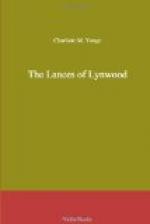In rushed Chandos, shouting his war-cry!—In dashed his stout warriors, and loud and fierce pealed forth “St. George! St George!” drowning the now feebler note of “Montjoie, St. Denis!” and fearful were the shrieks of horror and of pain that rose mingled with it. Hemmed in, attacked in front and rear, their retreat cut off, the French looked in vain for escape; some went down beneath the tremendous charge of the English, some cried for mercy, and surrendered as prisoners. Oliver de Clisson himself, seeing that all was lost, swinging round his head his heavy battle-axe, opened for himself a way, and, with a few followers, broke through the men whom Chandos had left outside, and, cutting down a groom who was holding it, captured one of his led horses, on which he rode off at his leisure, confident in his own gigantic strength.
So little resistance had been offered, that Arthur’s bold advance had involved him in little danger; he was borne onwards, and only was conscious of a frightful tumult, where all seemed to be striking and crushing together. At last, there was something of a lull; the cries of mercy, and offers to surrender, alone were heard. Arthur found his pony standing still, and himself pressed hither and thither by the crowd, from which he knew not how to escape.
Above these various sounds he heard an opening door—there was a press forward, which carried him with it. The heavy doors, shivered here and there by Clisson’s axe, had been thrown wide open; but the crowd closed in—he saw no more. He threw himself from his pony, struggled forwards, and at last, emerging between the arms of two tall men, he beheld Sir John Chandos dismounting from his war-horse, which was held by a grim, bloody, dusty figure in broken armour, whose length of limb, and the crisp, black, curled hair that showed through the shattered helmet, proved that it could be no other than Gaston d’Aubricour.
Arthur darted forwards, his heart upon his lips; but neither Knight nor Squire had eye or ear for him; they were hastily exchanging queries about—he knew not what—they were not of his uncle; and, borne on by his impatience, he hurried past them up the narrow stone stair. More than one corpse—a ghastly sight—lay on the steps, but he hastened on; half a dozen men were standing on the stones at the top, all, like Gaston, dusty and gory, and leaning on their weapons, or on the wall, as if exhausted. They were looking intently at the court, and gave no heed to the boy, as he ran on into the hall. Two men lay there groaning before the fire. Arthur stood and looked round, hesitating whether to ask them for his uncle; but, perceiving the spiral stairs, quickly ascended. Far and far up he wound, till he came to a low-browed arch; he paused, and saw a large vaulted room, through the loop-hole window of which shone a yellow stream of golden sunshine. There was a low bed in one corner, and on it lay a motionless form. On tiptoe, and with a throbbing heart, the boy approached; he saw the face—it was ghastly pale. He stood transfixed—could it be?—yes, it must still be, his own Uncle Eustace.




